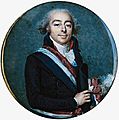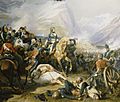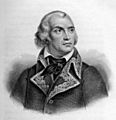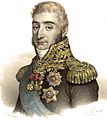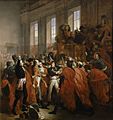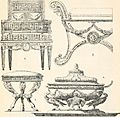French Directory facts for kids
The Directory (also known as the Directorate) was a special five-member group that ruled France from November 2, 1795, to November 9, 1799. It was the government of the French First Republic after a period of big changes and challenges. This government was eventually overthrown by Napoleon Bonaparte in an event called the Coup of 18 Brumaire, and a new government, the French Consulate, took its place.
Contents
What Was the Directory?
The Directory was set up after the Reign of Terror, a time when many people were executed in France. People wanted a more stable government. The Directory was designed to prevent any one person or group from having too much power. It had five "directors" who were in charge of running the country.
How the Directory Was Formed
After the fall of Maximilien Robespierre and the end of the Reign of Terror, France needed a new way to govern itself. A new constitution, called the Constitution of 1795, was written. This constitution created the Directory.
Setting Up the New Government
The new government had two main parts for making laws:
- The Council of Five Hundred: This group proposed new laws.
- The Council of Ancients: This group approved or rejected the laws proposed by the Council of Five Hundred.
The five directors were chosen by the Council of Ancients from a list provided by the Council of Five Hundred. Each year, one director was replaced. This system was meant to keep power balanced.
Challenges Faced by the Directory
The Directory faced many problems during its time in power. France was still recovering from the revolution, and there was a lot of disagreement and instability.
Political Struggles
The government had to deal with challenges from both sides:
- Royalists: These were people who wanted to bring back the king and the old monarchy. They tried to gain power and even rebelled.
- Jacobins: These were people who wanted a more radical republic, similar to the time of the Reign of Terror. Some, like François Noël Babeuf, even tried to overthrow the government.
Dealing with Rebellions
The Directory often used the army to put down rebellions. For example, in October 1795, government troops led by Napoleon Bonaparte fired on royalist rebels in Paris, stopping their uprising. This showed how important the army became in keeping the Directory in power.
Economic Problems
France also faced serious economic issues. Money was not worth much, and prices for goods were very high. This made life difficult for many ordinary people and led to more unrest.
The Rise of Napoleon Bonaparte
While the Directory struggled with internal problems, France was also at war with other European countries. This is where Napoleon Bonaparte became very important.
Military Victories
Napoleon was a brilliant general. He led French armies to many victories, especially in Italy.
- He won battles like the Battle of Arcole and the Battle of Rivoli, defeating the Austrians.
- These victories made him very popular and powerful.
Expedition to Egypt
In 1798, Napoleon led a military expedition to Egypt. Although some battles were won on land, the French navy suffered a major defeat at the Battle of the Nile. This left Napoleon and his army stranded in Egypt for a time.
The End of the Directory
Despite Napoleon's military successes abroad, the Directory at home continued to struggle with political instability and economic problems.
The Coup of 18 Brumaire
In 1799, some of the directors, including Emmanuel Joseph Sieyès, decided that the Directory was too weak and needed to be replaced. They planned a coup d'état, which is a sudden takeover of the government. They asked Napoleon to help them because of his popularity and military support.
Napoleon Takes Power
On November 9, 1799 (the 18th of Brumaire in the French Republican calendar), Napoleon and his soldiers took control. He confronted the members of the Council of Five Hundred. Although there was some resistance, Napoleon managed to seize power. The Directory was officially ended.
The Consulate Begins
After the coup, a new government called the French Consulate was formed. Napoleon became the First Consul, which made him the most powerful person in France. This marked the end of the Directory and the beginning of Napoleon's rise to absolute power.
Life During the Directory
Even with all the political changes, life in France continued. People tried to return to some sense of normalcy after the revolution.
Fashion and Culture
During the Directory, there was a reaction against the strictness of the Reign of Terror. People, especially the wealthy, started wearing more extravagant and colorful clothes.
- Groups like the Muscadins and Incroyables wore very fashionable and sometimes over-the-top outfits.
- Art and furniture styles also changed, moving towards a more classical look.
Public Life
Despite the government's struggles, public life slowly began to revive. Theaters reopened, and social gatherings became more common. However, the political uncertainty always lingered in the background.
Images for kids
-
General Lazare Hoche defeated a royalist army in Brittany (July 1795).
-
Government troops under Napoleon fire on rebels in Paris (October 5, 1795).
-
A silver 5 French franc coin from the Directory period.
-
François Noël Babeuf, a radical who tried to overthrow the Directory.
-
Bonaparte leading his soldiers across a bridge at the Battle of Arcole (November 17, 1796).
-
Bonaparte defeats the Austrians at the Battle of Rivoli (January 14, 1797).
-
General Jean-Charles Pichegru, accused of secretly supporting the royalists.
-
General Pierre Augereau, an ally of Bonaparte, who arrested royalist leaders.
-
Emmanuel Joseph Sieyès helped plan the coup that ended the Directory.
-
Joseph Fouché, the Minister of Police, who did not stop Bonaparte's takeover.
-
Bonaparte as the new First Consul, by Antoine-Jean Gros, around 1802.
-
Louis Marie de La Révellière-Lépeaux, one of the directors.
-
Jean-François Rewbell, another director.
-
Lazare Carnot, a brilliant organizer but not a good politician.
-
Imaginary view of the gallery of the Louvre as a ruin, by Hubert Robert (1796).
See also
 In Spanish: Directorio (Francia) para niños
In Spanish: Directorio (Francia) para niños
 | Kyle Baker |
 | Joseph Yoakum |
 | Laura Wheeler Waring |
 | Henry Ossawa Tanner |



